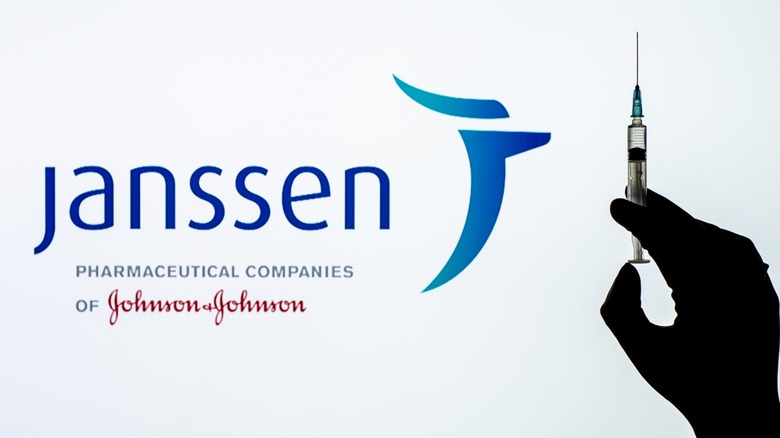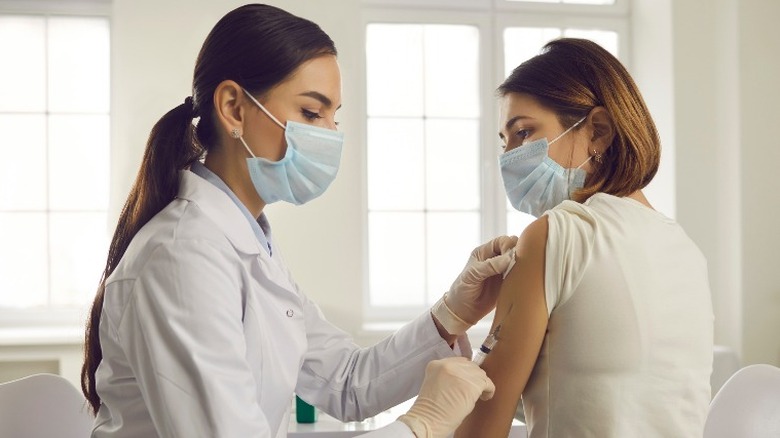The Johnson & Johnson Booster May Be A Good Choice For Some People
According to a statement released by Johnson & Johnson, two recent studies revealed that a booster shot of its vaccine provides strong protection against severe COVID-19 infection and hospitalizations due to the Omicron variant. A South African study showed that a Johnson & Johnson booster was 85% effective against hospitalization in the midst of the dominant Omicron variant wave while a U.S. study demonstrated that the Johnson & Johnson vaccine provided "a strong immune response from cells known as T-cells" (via CNN).
"Even before you factor in the increased infectiousness of Omicron, we have to remember that healthcare workers on the frontlines are at a greatly increased risk of being affected by COVID-19 in the first place," Dr. Glenda Gray, president and CEO of the South African Medical Research Council (SAMRC), said in the Johnson & Johnson statement. "We are therefore encouraged to see that boosting with the Johnson & Johnson COVID-19 vaccine regimen provides strong protection in a challenging real-world setting where there is an elevated risk of exposure — not just to COVID-19, but to the highly transmissible Omicron variant," Dr. Gray added.
The Johnson & Johnson booster was also found to be effective when administered to individuals who initially received the Pfizer vaccine (via CNN). This result supports the idea that "mixing and matching" vaccine types could be an effective approach. However, some countries in Europe announced that they are no longer accepting the Johnson & Johnson shot as a valid vaccine (via Foreign Brief).
A backup option
As of late December, the Centers for Disease Control and Prevention updated its vaccine recommendations, stating that the agency prefers that people receive the Pfizer or Moderna vaccines over the Johnson & Johnson vaccine. This recommendation is due to certain negative events associated with the Johnson & Johnson vaccine, including the formation of blood clots and a rare condition called Guillain-Barré Syndrome (GBS), which is when the immune system attacks nerve cells. A recent study published in the journal Science also revealed that of the three vaccines, Johnson & Johnson's showed the biggest decline in effectiveness over time, from just over 87.9% in March 2021 to 13.1% in September 2021.
Health experts also agree that the single-dose Johnson & Johnson vaccine does not provide the same level of protection as Pfizer and Moderna, which are two-dose mRNA vaccine series. "While one dose to prevent COVID was always desirable to improve vaccine access and acceptance, we now have irrefutable evidence that two doses provides significantly more protection," John Brownstein, chief innovation officer at Boston Children's Hospital, told ABC News.
Johnson & Johnson maintains that its vaccine "is an important choice for people who can't or won't return for multiple vaccinations or who would remain unvaccinated without an alternative to the mRNA vaccines," the company said in a statement. Similarly, the CDC says the vaccine can be a viable option for people who "had a severe reaction after an mRNA vaccine dose or who have a severe allergy to an ingredient of Pfizer-BioNTech or Moderna (mRNA COVID-19 vaccines)," those who "would otherwise remain unvaccinated for COVID-19 due to limited access to Pfizer-BioNTech or Moderna (mRNA COVID-19 vaccines)" and people who "[want] to get the J&J/Janssen COVID-19 vaccine despite the safety concerns."


